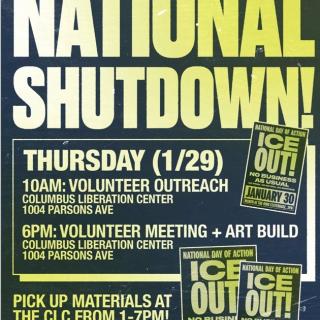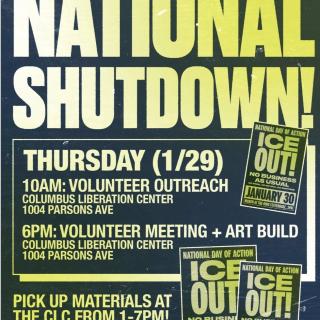Bol Aweng, now of Hilliard, Ohio, is one of the Lost Boys of Sudan. At the age of six, he was forced to flee his village and travel 1,500 miles on foot to a refugee camp in Kenya. Bol eventually came to the United States. He graduated from The Ohio State University, majoring in fine art, and was awarded the Robert Duncan Alumni Citizenship Award for starting the Buckeye Clinic in South Sudan.
Bol lives in Hilliard, Ohio with his wife and five children. He speaks to thousands of students each year, sharing his story and raising funds for his clinic.
The following is his chapter “The Journey of Hope” from Far From Their Eyes: Ohio Migration Anthology, edited and published by our friend Lynn Tramonte of the Ohio Immigrant Alliance.
I was born in southern Sudan, Africa. At the time, Sudan was the largest country in Africa, but my village, Piol, was tiny. I enjoyed carefree days taking care of my family’s cows, like other boys my age. I belong to the Dinka tribe. To the Dinka, cows are so important. Boys often went far away to the river to find water and good grass for them.
But in 1987, when I was six years old, civil war broke out in southern Sudan. Soldiers came into Piol firing weapons. My people were shocked to find that there were bombs coming from the sky and tanks rolling across our once-beautiful fields. The people were frightened, and it was total chaos. Terrified, I ran away like many of the boys in my village. Even the animals were fleeing.
I thought I would go somewhere to hide, and my people would come back. But the village was on fire. All we could hear was the sound of guns. My village was decimated by the enemy. I wondered if I would ever see my family or home again.
Although I did not know it yet, my life would never be the same.
I ended up walking away from my village. I searched for a safe place, but there was none. The soldiers were everywhere.
I did not know where I was going, so I followed other boys who were looking for a safe place. I began a long journey with thousands of other “Lost Boys.” We walked for miles and miles, for days and days, weeks and weeks, months and months. The environment was so hostile to us. Some boys were so exhausted that they could not make it across the desert. The lack of food and water, and the heaviness of our sorrows, made it difficult to continue. We tried our best to carry those who couldn’t walk, but some of my friends just couldn’t go any further.
They did not make it. Barefoot and with almost no food and water, I walked for over seven weeks looking for a place without war. Within days of beginning the journey, we were starving. We had to eat wild leaves, fruits, roots, anything we could find. We had never tried to eat these things before, but we needed to stay alive. As we walked, we also had to fend off wild animals. Lions were one of the common animals that we faced along the way. When we saw a lion, the only thing we could do was to come together in a tight group. Together, we tried to appear larger than the lion and scare him away.
Eventually, we made it to Ethiopia and our numbers had swollen to 35,000. The people who had hunted us could not cross the border. When we arrived, however, there was no room for us in the refugee camp. We had to build our own shelters and gather food. They gave some the duty to cut grass or to cook. I was the leader of a group of a hundred boys.
After we built the shelters, we built a school. But in the meantime, we met outside under the shade of a tree for our schooling. Education was important, and it kept our minds occupied. We learned English and math under the trees. Our teachers tried to help us rise above our situation, so that someday we could return to Sudan as educated leaders.
Throughout the journey, we did not have a building or any holy place to worship. So, we used the shade of trees to have our service. We studied the Bible, prayed, and sang songs of praise. When we were under the trees, the military helicopters could not see us and bomb us. We felt we were on a journey like in the Bible. Like God’s people, we were travelling in the wilderness. We took courage from that story.
In the refugee camp, though, we finally did not have to worry about meeting together. Sadly, after about four years living this way, war came to Ethiopia. We had to flee again. The soldiers tried to force us to go back to Sudan, which meant crossing the Gilo River, which was swollen with the heavy spring rains. Behind us, we heard gunshots from the soldiers. I was not an excellent swimmer, but I had no choice but to jump into the river’s dangerous and strong currents. The current dragged some. Those who could not swim drowned, “just like that.” Crocodiles killed others. It was a terrifying time and the longest moment of my life. As I struggled against the raging water, I discovered I had somehow reached the other side. Though I was exhausted, I ran as fast as I could go.
We lost about two thousand that day because of the bullets, crocodiles, and dangerous currents of water that carried my friends away. That day I lost many people I loved.
Thousands of us had just crossed the desert, and we were finally close to Kenya. We had come so far and didn’t have the energy to look for a safe place to sleep. So, we lay down in a dried-up riverbed and tried to get some rest. In the night, the soldiers ambushed us while we slept there in the open. I heard gunfire. I was disoriented and tired. I couldn’t figure out which direction the shooting was coming from.
I woke up and found myself soaked. I could smell the blood. I felt myself, then saw that my friend, sleeping beside me, was dead. It was his blood that had sprayed on me. Many died that way. Although we had already spent so many years running, once again we were forced to flee, this time to Kenya where the enemy was not allowed. It was a three-day, non-stop walk to the border. We had no shoes, and the road was very rocky. When I saw the sign welcoming us to Kenya, I felt like I was finally breathing fresh air. I was so relieved that the soldiers could not follow us to that border. I hoped we were finally going to be safe.
We lost many of our friends because of the gunshots, hunger, river crossings, wild animal attacks, and dehydration. Out of the 35,000 boys that set out on our way, only 16,000 made it to the Kenyan border. Nineteen thousand died along the way.
I spent fourteen years in refugee camps in Ethiopia and Kenya. I lived in miserable conditions in these camps, with hundreds of thousands of other refugees. I slept in a 3x4 meter shelter with my cousin, Jok, and shared meager rations of corn flour and lentils. Deprivation, disease, and death were everywhere in these camps.
Then, one day, we were told that we could apply to go to the United States as refugees. I filled out an application and had several interviews. I waited and waited. It took three years for my refugee application to be approved. One day I received a letter that said I was going to be “resettled” in the United States.
On my way to the United States, they delayed my flight in Amsterdam. There seemed to be much confusion and worry. It was very hard for me to figure out what exactly was going on. The date was September 11, 2001: the day terrorists attacked the Twin Towers in New York.
Did they attack because I was going to the United States? Do I follow war, or does war follow me?
Eventually, I flew to Nashville, Tennessee and was resettled there as a refugee. Later, I transferred to The Ohio State University. When I became a U.S. citizen in 2007, I decided I could now return to my homeland.
I had heard that my parents were alive, and I wanted to reunite with them. I stayed for a month and saw the terrible living conditions of my family. When I returned to Ohio, my cousin Jok, and I decided that our “journey” would continue and become one of hope.
Our journey back to Sudan helped us realize we could change lives in our country through building a much-needed medical clinic for women and children.
I realize Americans do not know about the struggles and sufferings of my people. The problems in Sudan are not reported and are “hidden,” as if in shadow. Horrible events are still occurring in South Sudan. I have told my story in churches, schools, and throughout the community to bring to light what I went through and what my country is still experiencing.
My story had touched many, and many joined me to make my dream a reality. Over several years, many people gave their time, prayers, and financial support. A committee helped me organize and start the Buckeye Clinic in South Sudan. Students helped raise funds to build the clinic.
Today the Buckeye Clinic is helping to improve the lives of my people and giving them hope!



